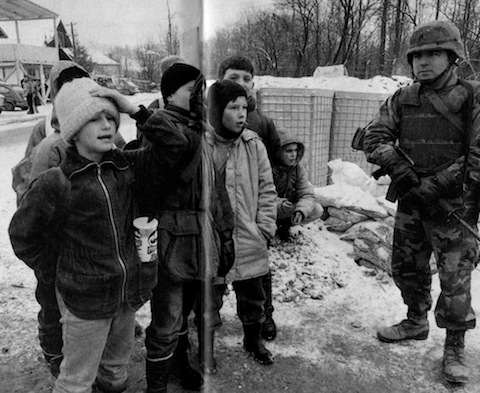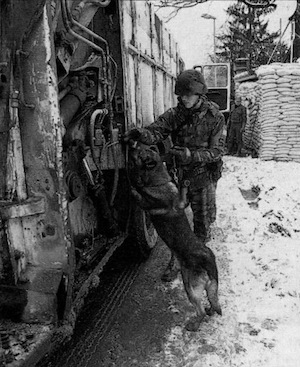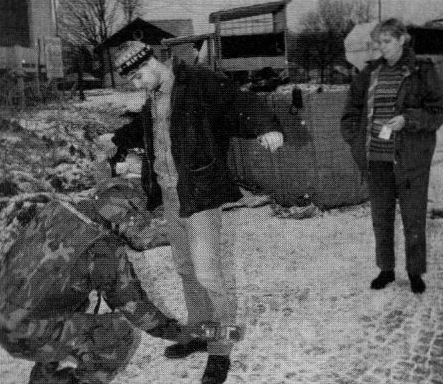
Outside the front gate of Tuzla Air Base there was a small swap-meet going on. In exchange for a pencil given to waiting Bosnia children, the base’s gate guards got a couple of pieces of local candy or gum, a nice change from the sweets that come in an MRE. There was a shortage of school supplies in Bosnia, and one pencil could make a big difference for a kid, especially if he got it from his new “big brother,” an American soldier.
For many Tuzla residents, the gate guards may be the only U.S. members of the NATO Implementation Force they’ll meet firsthand. The town is “off limits” for Americans.
The base is secured, separated from the town by barbed wire interrupted by three observation posts. The front gate is the only way in and out. So the gate is where soldiers are slipped handshakes by thankful Bosnian adults on their way to work or to shop, and where children headed home from school can adopt the guards for a couple of hours.
SSgt. Steven Adams, a squad leader with the Germany-based 501st Military Police Company, said he missed his three-year-old son and appreciated the interaction he had with the kids at the gate. And though the smiling faces of the children lifted his spirits, Adams said he could tell they had been through a great deal of suffering.

“It’s so sad, ’cause you look at their faces and you know that they have no place to go and nothing to do. They’re bumming around here during school hours and they’re not dressed right,” he said. He remembered one 14-year-old boy who told him his parents were both dead and that he had no home.
“You hear a lot of horror stories.” Adams said. “I wasn’t happy about coming here. But after getting here and seeing the people, I’m glad we’re here. It’s a little bit of time out of our lives, but so what? It’s these people’s lives.”
Once the U.S. forces took over the base from the United Nations Protection Force, they redesigned the gate entrance to make sure it would be difficult for a speeding vehicle to crash into the compound. To enter, vehicles have to slow down to navigate through an S- shaped path lined with speed bumps. Several machine gun bunkers are also incorporated into the plan.
“This is probably the most secure place I’ve ever been.” said Sgt. Jason Hall of the Vicenza Italy-based 3rd Infantry Regiment. “We make the vehicles weave in and out to slow the traffic down. We put speed bumps in. Every body comes through here nice and slow, so we can check everybody thoroughly.”
Because it is the only way in and out of Tuzla Air Base, heavy traffic keeps the gate busy. IFOR patrols and convoys roll through continuously. Bosnian translators and other base workers on foot travel in and out all day. Local bakers deliver a daily supply of fresh bread. All of these vehicles and people must be checked, the people by a metal detection wand and the vehicles by dogs who can detect any kind of contraband.

Ringo, a Belgian Malinois working dog. used his nose to help sniff out potential trouble. Senior Airman Matthew Arpano, Ringo’s partner, said if his dog had a rank “I guess he’d be a sergeant.”
Arpano, assigned to the Air Force’s 52nd Security Police Squadron in Spangdahlem, Germany, would not reveal w hat Ringo searched for, though he indicated the dog was trained to find just about everything. Arpano feared that if the dog’s specific mission was identified the “bad guys” would change their tactics based on what they knew the dog was trained to find.
“We’re searching for any kind of contraband or for anyone trying to gain access to the base,” Arpano said. With base camp construction, gravel trucks were a recent big search mission. But what happens when the vehicle is a garbage truck and the dog has worked up an appetite?
“We train with distracting odors, but he’s a dog.” Arpano said Ringo would rather sink his teeth into contraband than food when he’s at work. “He’s always ready to go.”
Vehicles and drivers leaving the base have to be checked just as thoroughly as those entering. Many vehicles were stolen from the compound during UNPROFOR’s three-year stay.
The gate guards man the fixed OPs and the front gate, as well as performing security patrols outside the compound. The patrols are intended to gather information about the terrain and to gauge the people’s reactions to the NATO presence, said Capt. Malcolm Frost, a 3rd Inf. company commander.
“You don’t sit and wait for something to happen,” he said. “We show them that we’re here to enforce the peace plan and the zones of separation.”
The soldiers are keenly aware they are not only the first line of defense for the base, but also American ambassadors and new neighbors. It is important for them to understand the impact they are having on the Tuzla community, said SSgt. Allen Leonard.

“They seem to be taking it well, with all of the changes and the traffic,” Leonard said. “Since we are a major power, they’re going to watch how we act. We’re polite, firm, and do what we have to do. If we are polite and respectful, everything is going to go fine.”
A key to his understanding the Bosnians, Leonard said, was to educate himself on the region and its history.
“The more you know about the area, the better prepared you are to deal with the people and the different cultures,” he said. “If you don’t know what’s going on, you’re going to be lost.”
![]()
Story and Photos by SFC Larry Lane
Soldiers
May, 1996
| Managing Civil Affairs in Bosnia | On the Gate in Tuzla | Far-Flung Support: Operation Joint Endeavor |
